Anthill for Windows
Anthill™ is a powerful program for calculation of reliability and statistical analysis. The program is based on Monte Carlo method and stochastic simulation technique. The model for analysis can be constructed using various mathematical and logical functions. The statistical analysis and the reliability analysis are performed using generated discrete values of the independent variables in the functional expressions. In each Monte Carlo simulation step, also called trial, the values of independent variables are sampled from the corresponding probability functions. Using these variable values, the values of the mathematical expressions are calculated and the resulting values are recorded.
After the specific number of trials has been performed, statistical analysis of sampled values of the mathematical expressions is performed and the results can be displayed in various graphical forms. Resulting logs, histograms and statistical parameters can be saved for the further extensive post-processing (e.g. deeper statistical analysis or transformation to graphical form) of resulting data.
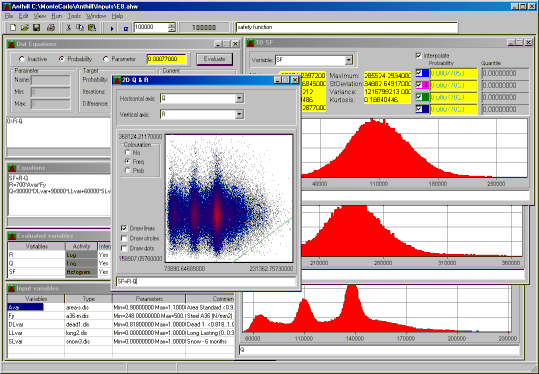
|
Main features:
stochastic simulation, reliability analysis, Monte Carlo
method
model for analysis specified using various mathematical
and logical functions
up to 256 input random variables defined in parametric or
non-parametric form
up to 256 monitored output variables. Statistics
evaluation, distribution estimation, whole history recording
graphical and numerical output
|
A reliability analysis concerns a study of the probability of certain event. This event can, for instance, be the failure of technical system. The occurrence or non-occurrence of this event is simulated a specified number of times according to the Monte Carlo technique using random input variables. The resulting probability of the occurrence of the event is then calculated as the number of simulations, in which the event occurred, divided by the total number of simulations.
Free Lite version of program can be downloaded here. Professional version of program can be ordered at
artech@noise.cz for the prices listed below.
LoadCom for Windows
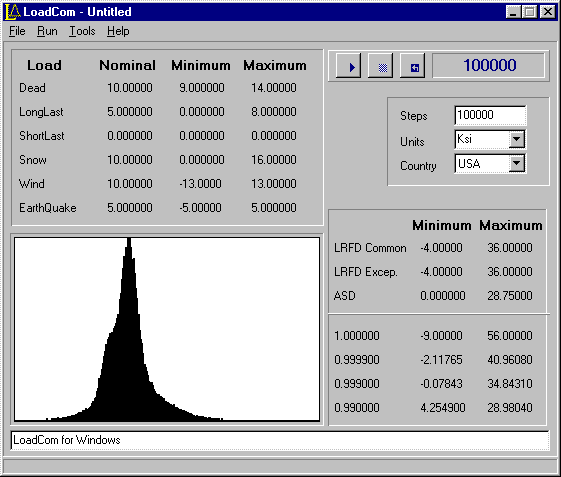
Program LoadCom (Load Combination) is a tool for load effect combination analysis according to selected standards: Allowable Stress Design (ASD), Partial Factor Design (ASCE/AISC-LRFD), Limit States Design (Canadian National Standards), DIN, Eurocode and the Simulation Based Reliability Assessment concept.
Combination of up to six load effects (Dead load, Long Lasting load, Short Lasting load, Snow load, Wind load and Earthquake load) can be calculated. It is possible to enter the input values units (SI or US Customary) and to perform unit conversion. Importance of a structure for the Partial Factor Design calculation can be selected (Common or Low Importance/Exception). Resulting load effect combinations are calculated and displayed along with the resulting histogram. Absolute maximum and minimum values of load combinations for SBRA design as well as values for three selected probability levels are calculated.
The program can be ordered at artech@noise.cz for the prices listed below.
System requirements
Following programs are designed to run under operating system MS-DOS. They can be started from MS-DOS prompt of Windows 3.x, Windows 95 or Windows 98. They don't work under Windows NT or Windows 2000. An ASCII text editor for creating or changing histogram, configuration and input files is necessary. Edit distributed with MS-DOS or Notepad from Windows can be used. Fast IBM PC compatible computer with at least 512kB of free base operation memory is recommended.
LoadCom
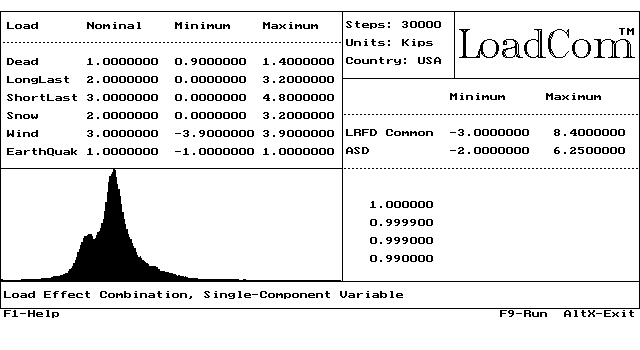
The LoadCom (Load Combination) program serves as a tool for load effect combination analysis according to Allowable Stress Design (ASD), Partial Factor Design (ASCE/AISC-LRFD), Limit States Design (Canadian National Standards) and the Simulation Based Reliability Assessment (SBRA) concept. Importance of a structure for the LRFD calculation can be selected (Common or Low Importance/Exception), three different probability levels for the Probability Based Design can be entered. Combination of up to six loads (Dead load, Long Lasting load, Short Lasting load, Snow load, Wind load and Earthquake load) can be calculated.
ResCom
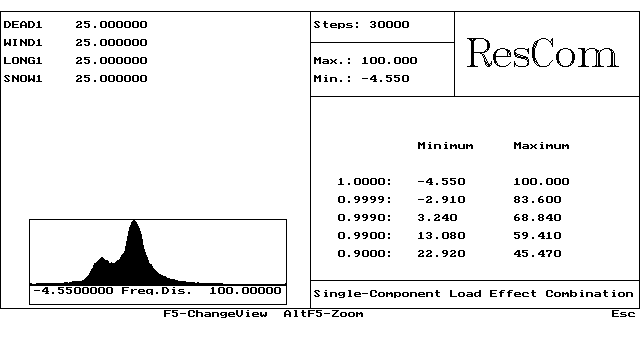
The ResCom (Response Combination) program allows the determination of the structure response to a single-component load effects combination. Combinations of up to sixteen mutually uncorrelated load effects can be calculated. Four different probability levels can be entered. SBRA Load duration curves expressing the random variable loads are represented by corresponding histograms. Database containing common histograms is available and new histogram can be easily created.
DamAc
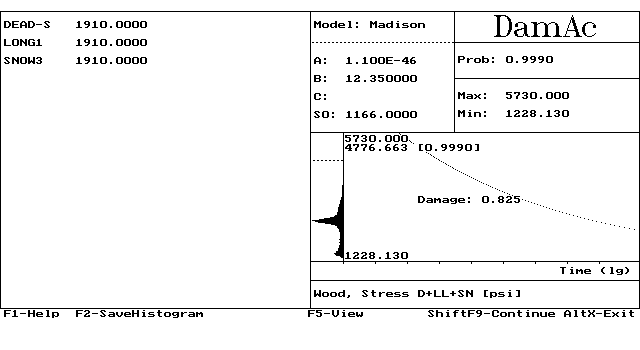
The DamAc (Damage Accumulation) program is an assessment tool. The safety of a wood member exposed to a time dependent random load effect combination expressed by accumulated damage (based on Madison curves, SJ curves, etc.) is assessed utilising this particular SBRA program. Combinations of up to sixteen load effects can be considered. All load effects are represented by histograms. Database containing common histograms is available and new histogram can be easily created.
M-Star
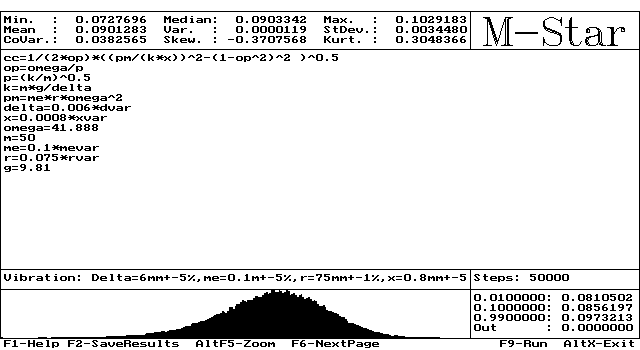
The M-Star is an universal Monte Carlo-based simulation program which allows statistical analysis of an variable expressed by a mathematical expressions. Up to 21 equations with various arithmetic, trigonometric, logical, etc. functions of up to thirty random variables can be used. The generation of input values is based on distribution functions for the independent variables of the functions. In each Monte Carlo simulation step, also called trial, the values of independent variables are sampled from the corresponding probability functions. Using these variable values, the values of the mathematical expressions are calculated. Up to 999,999,999 simulation steps can be accomplished. Histogram of analysed variable is created and various statistical parameters are calculated. Probability and quantile assessment is available. Histograms can be displayed in various graphical forms and results can be saved for further evaluation and processing.
Anthill
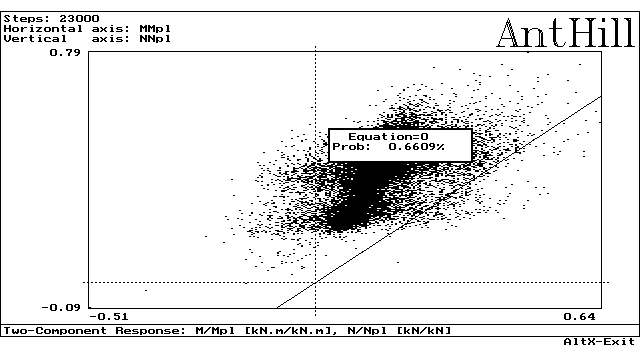
The program Anthill allows evaluation and display of multi-dimensional (multi-component) random variables. It is possible to evaluate algebraic expressions containing up to thirty random variables in to 32 equations. The generation of input values is based on distribution functions for the independent variables of the functions. In each Monte Carlo simulation step, also called trial, the values of independent variables are sampled from the corresponding probability functions. Using these variable values, the values of the mathematical expressions are calculated and resulting values are stored. When the specified number of trials is achieved then the reliability analysis based on collected data is performed. The probability of the occurrence of certain event is then calculated as the number of simulations, in which the event occurred, divided by the total number of simulations. A direct reliability assessment as well as an iteration procedure for model parameter estimation is included.
Anthill for Windows Lite
Lite version of the program Anthill for Windows version 2.6 with basic examples and histograms.
This Lite version has full functionality of the professional program with the only
limitation to 50000 simulation steps. See above for more information about the
program Anthill for Windows.
Lite versions of SBRA programs
Whole set containing free Lite versions of MS-DOS programs M-Star, Anthill, LoadCom, ResCom and DamAc with more than 200 examples can be downloaded here. This set can be found on the diskette attached to the book Simulation based reliability assessment for structural engineers (1995, CRC PRESS, inc., Boca Raton, Florida, ISBN 0-8493-8286-6 ). A qualitatively new SBRA method is documented in the book containing “rules of the game“, i.e., rules of a fully probabilistic structural reliability assessment concept. A set of attached examples and computer programs allow the reader to understand in no time the substance of the transition from deterministic to probabilistic “way of thinking“. A transition from prescriptive methods (applied in current codes for structural design) to probabilistic concepts corresponding to the potential of modern computers is addressed. The SBRA method bypasses the Load and Resistance Safety Factors, Design Point and other quantities used in the Partial Factors Method. It leads the user to understand the interaction of individual random variables, the analysis of the reliability function and the safety expressed by comparing the probability of failure and target probability contained in specifications.
Demonstration versions of SBRA programs
Free Demo versions of MS-DOS programs M-Star, Anthill, LoadCom, ResCom and DamAc with many examples can be downloaded here. These demonstration programs can be found on diskette attached to the book Tragwerksbemessung. Von deterministischen zu probabilistischen Verfahren (ACADEMIA, Prague, Czech Republic, ISBN: 80-902227-6-5 and 80-200-0706-7). The German speaking readers can find in this textbook a detailed explanation of a qualitatively new fully probabilistic SBRA method (Simulation-Based Reliability Assessment proposed in 1995) allowing for a transparent calculation of the probability of failure using direct Monte Carlo simulation technique. The limit states of the carrying capacity (safety) as well as serviceability are addressed. The SBRA method documented in the book and illustrated on the many examples leads the reader from deterministic to probabilistic “way of thinking“ in order to be ready for the transition from the current “prescriptive“ methods applied in current codes for structural design to fully probabilistic concepts corresponding to the computer era.
All programs can be ordered at artech@noise.cz. University discounts, multilicenses and site licenses are available.
| Single-installation licenses |
EUR |
Kč |
| LoadCom |
120 |
3500 |
| ResCom |
120 |
3500 |
| DamAc |
120 |
3500 |
| M-Star |
300 |
8750 |
| Anthill |
300 |
8750 |
| LoadCom for Windows |
180 |
5250 |
| Anthill for Windows |
600 |
17500 |
| Set of all MS-DOS programs (LoadCom, ResCom, DamAc, M-Star and
Anthill) |
600 |
17500 |
| Upgrades |
EUR |
Kč |
| from Anthill for MS-DOS to Anthill for Windows |
420 |
12250 |
| from M-Star to Anthill for Windows |
420 |
12250 |
| from M-Star and Anthill for MS-DOS to Anthill for Windows |
300 |
8750 |
| from LoadCom for MS-DOS to LoadCom for Windows |
90 |
2625 |






